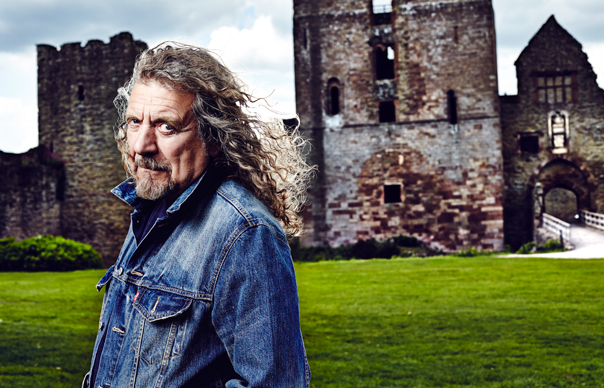Plant’s stories are satisfyingly mythic in scope, but laced with plenty of self-effacing humour. Thankfully, their potency remains unchanged, regardless of whether he’s talking about scrapes in Morocco with Page, or events that took place quite literally just up the road. For all the importance of North Africa, another key touchstone in Plant’s narrative is Bron-Yr-Aur, the 18th century farm cottage he first visited when he was 7. “It’s pretty remote up there,” he says. “I haven’t been for ages because they want me to buy it now. They’re so pissed off at everyone going there from Japan or somewhere to pay homage. The remarkable difference between the history of the English and the history of the Welsh, and the poetry of the English and the poetry of the Welsh, is there’s a longing. I think in Welsh it’s called ‘hiraeth’. The whole thing about parts of Wales is it’s like the blue note in a progression. Like there’s some doleur… not quite sadness, but a remote, untouchable, yet-to-be-sorted out thing. I don’t have any medication to deal with it, and neither should I, because it inspires me and it means that everything isn’t revealed for me. I’ll never know. I know it sounds silly and strangely abstract, but I find something in those physical places that is unexplained and unfinished, and it’s beautiful.”
Plant took Page there in 1970, after Led Zeppelin 2. While at the cottage, the pair wrote songs that appeared on four of their later albums. Crucially, the trip proved instrumental in the development of the band’s aesthetic – adding texture and folky restraint to the bulldozer riffs of their first two albums. Looking back on his early song writing, Plant admits, “When I started, I was jammed into Dion And The Belmonts. You take that, and a few Chuck Berry lyrics, and Howlin’ Wolf, into 1967, ’68. That’s what Zeppelin won, that’s where I come into it. I was very young when I was making records, and I was really mostly concerned about sounding good. You know, ‘Oh baby!’ I just wanted to sound like somebody you should be frightened of,” he laughs. “I probably succeeded!”
Out of the writing sessions at Bron-Yr-Aur came the beautiful, mournful ballad “That’s The Way”: a significant breakthrough for Plant as a lyricist and a pivotal song on Led Zeppelin 3. “I was growing up, lyrically,” he explains. “I’m concerned about Vietnam, I’m concerned about Paris in flames, I’m concerned about everything. I’m a dad for the first time in my life. But I don’t know how to express myself. I was fumbling into trying to say something proper. If I’d been living in the Bay Area in San Francisco, I’d have got it down years before, because out there they had such prolific, virile, social commentary on the times. But not so in the new blues-rock movement, which was basically people singing like black kids did in ’62, ’63. It was brilliant, but it was expressive rather than lyrical. I was surrounded by the finest guys who could play like mothers, but I didn’t really have the state of mind or awareness to start talking about stuff. It came in, late on, in bits and pieces.
“At Bron-Yr-Aur, I think I finally realised I was part of something, a contributor. It had really good legs. It was going somewhere and we were able to move through the spheres. Around us, a lot of people got a groove and stuck with it, so the idea of creating different shades and colours seemed to me to be very fortuitous. If we’d have only carried on from where we’d left off with Zeppelin 2, it would have been a big strong record but it wouldn’t have shown that we had any intuition. Later on, after Zeppelin 3, it was a juggernaut. But Percy could escape into the Misty Mountains, not covering myself in talcum and sitting in Istanbul in a knocking shop. But getting back, getting your fingers into the ground and the soil again. Touch the earth. Ho, ho. But seriously so, you know?”
Did Plant ever feel that the extravagance and superstardom of Zeppelin at their peak was a distraction from his questing imperative?
“No, I didn’t feel it then, I didn’t feel it at all. Driving up to Bron-Yr-Aur in an old Jeep with a blue-eyed dog hanging on for dear life and a piss-pot tied to the back by the gas tank and your wife and your baby. You’re off!”
‘All the old gods are long gone. But still…” An interview with Robert Plant
Robert Plant on Led Zeppelin, his solo career and more...

Trending Now
Robert Plant's excellent new album lullaby and... The Ceaseless Roar goes on sale today [September 8], so it seemed like a good opportunity to post the full text of my Plant cover story from last month's Uncut... Hope you enjoy it.
Recently, Robert Plant has been troubled by bees. “I’ve spent ...
Advertisement

